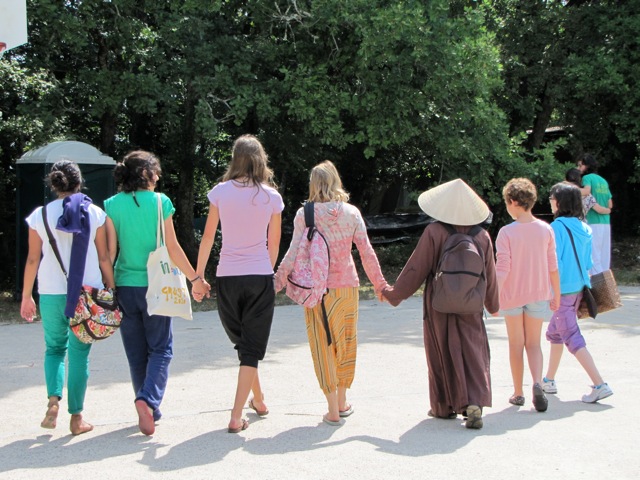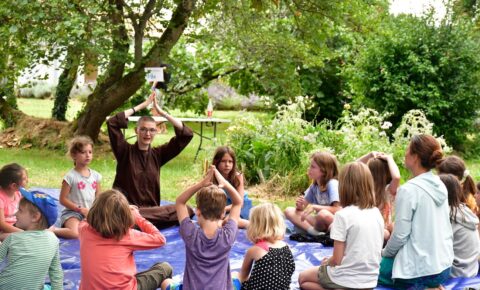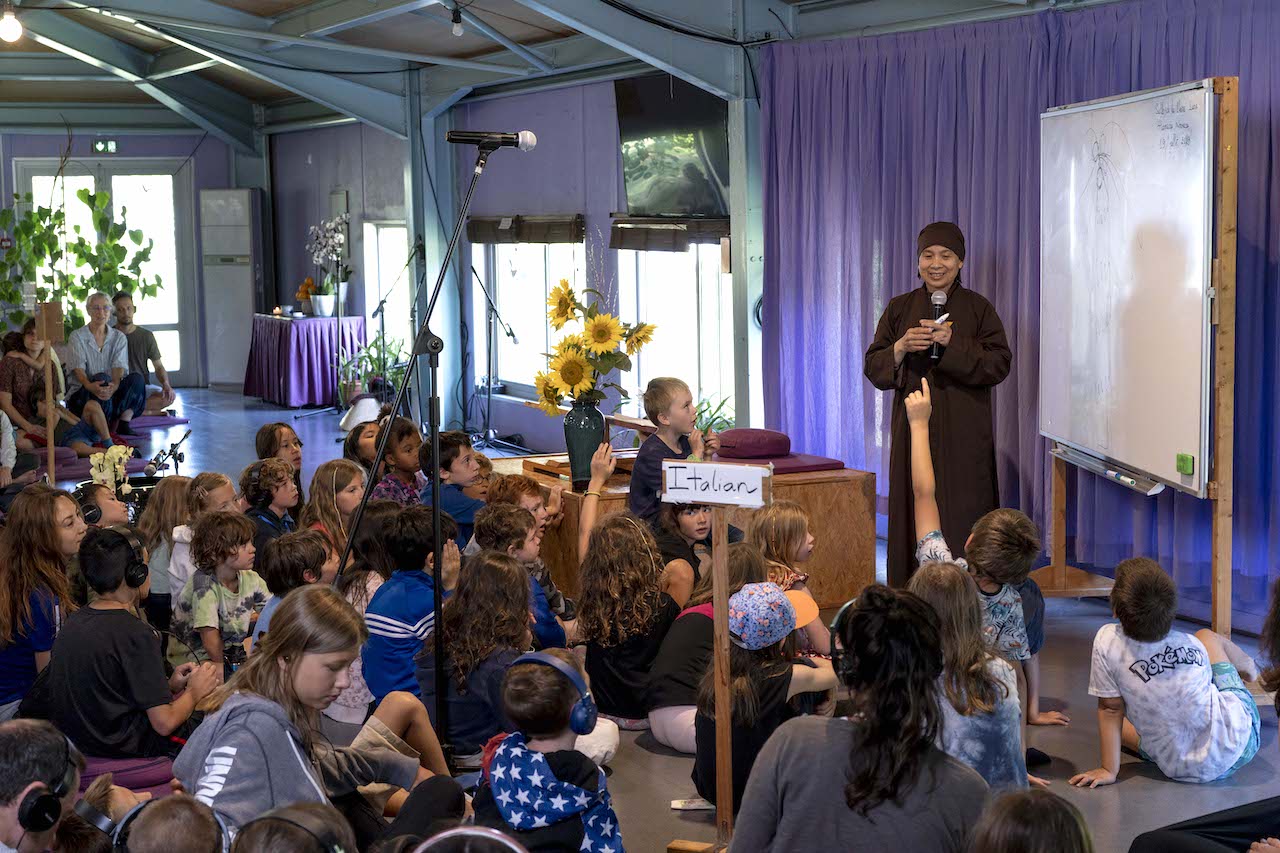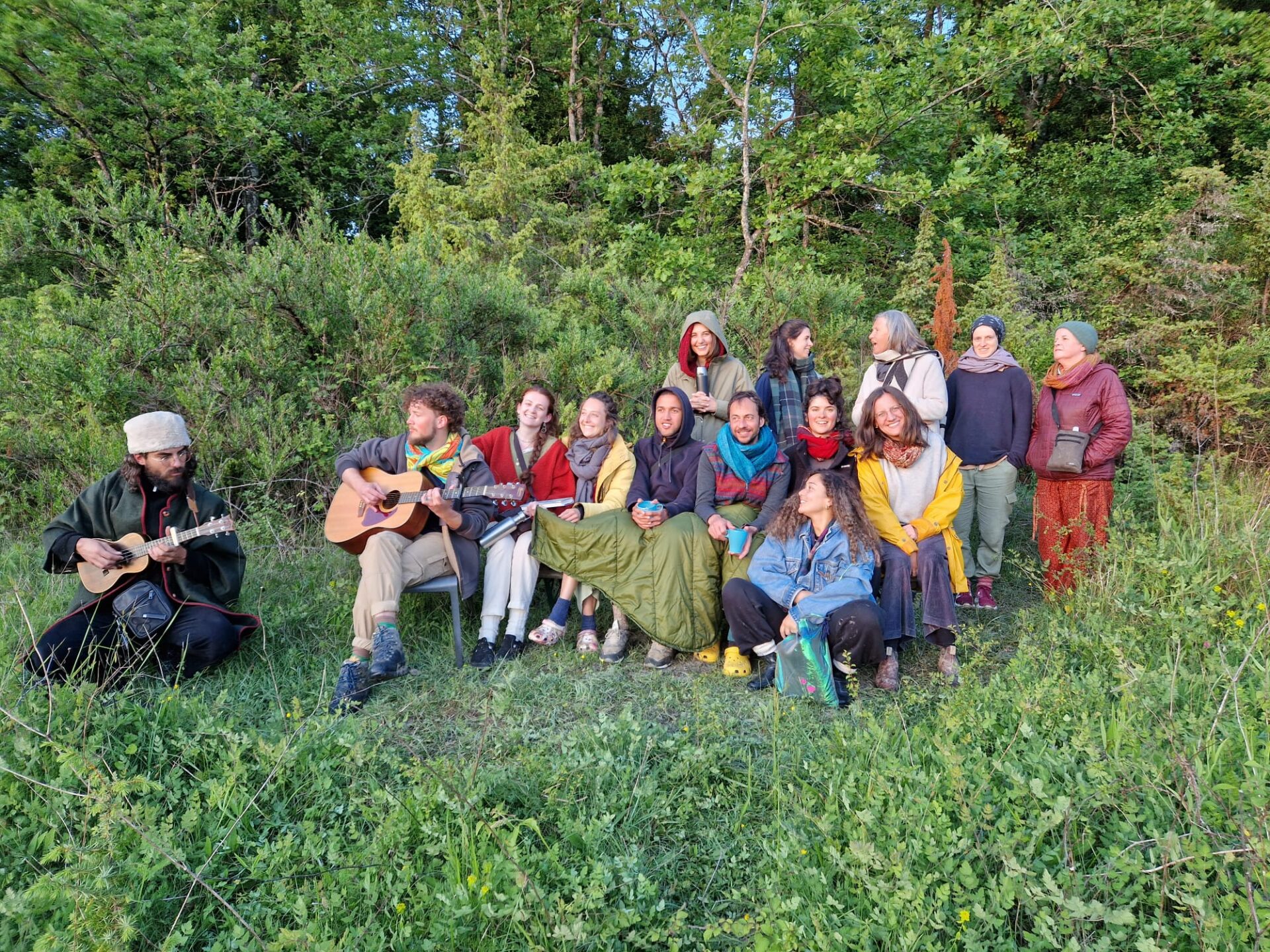Thay, Sister Chan Khong and over 40 Plum Village Dharma Teachers from all over the world signed the Buddhist Climate Statement to World Leaders yesterday, October 29th, 2015.
This new declaration builds on Thay’s powerful message “Falling in love with the Earth”, submitted to the United Nations last year, and his call to action in his bestselling books on Buddhism and ecology, The World We Have (2008) and Love Letter to the Earth (2013).
>> Offer your own signature here.
Yesterday’s declaration was also signed by His Holiness the Dalai Lama and Buddhist leaders from over a dozen countries – making it one of the most inclusive statements of its kind ever issued by Buddhist leaders. It has received positive media coverage, including from the BBC, the Huffington Post, the Christian Science Monitor, PBS, the Bangkok Post and China Post.
We hope that this statement will lay the foundations for the global Buddhist community to engage at all levels to offer our practice, insights, compassion and support towards successful Climate Talks in Paris this December.
Buddhist Climate Change Statement to World Leaders
October 29th, 2015
We, the undersigned Buddhist leaders, come together prior to the 21st Session of the Conference of Parties (COP21) to the UN Framework Convention on Climate Change (UNFCCC) in Paris, in order to add our voices to the growing calls for world leaders to cooperate with compassion and wisdom and reach an ambitious and effective climate agreement.
We are at a crucial crossroads where our survival and that of other species is at stake as a result of our actions. There is still time to slow the pace of climate change and limit its impacts, but to do so, the Paris summit will need to put us on a path to phase out fossil fuels. We must ensure the protection of the most vulnerable, through visionary and comprehensive mitigation and adaptation measures.
Our concern is founded on the Buddha’s realization of dependent co-arising, which interconnects all things in the universe. Understanding this interconnected causality and the consequences of our actions are critical steps in reducing our environmental impact. Cultivating the insight of interbeing and compassion, we will be able to act out of love, not fear, to protect our planet. Buddhist leaders have been speaking about this for decades. However, everyday life can easily lead us to forget that our lives are inextricably interwoven with the natural world through every breath we take, the water we drink, and the food we eat. Through our lack of insight, we are destroying the very life support systems that we and all other living beings depend on for survival.
We believe it imperative that the global Buddhist community recognize both our dependence on one another as well as on the natural world. Together, humanity must act on the root causes of this environmental crisis, which is driven by our use of fossil fuels, unsustainable consumption patterns, lack of awareness, and lack of concern about the consequences of our actions.
We strongly support “The Time to Act is Now: A Buddhist Declaration on Climate Change,” which is endorsed by a diverse and global representation of Buddhist leaders and Buddhist sanghas. We also welcome and support the climate change statements of other religious traditions. These include Pope Francis’s encyclical earlier this year, Laudato Si’: On Care for Our Common Home, the Islamic Declaration on Climate Change, as well as the upcoming Hindu Declaration on Climate Change. We are united by our concern to phase out fossil fuels, to reduce our consumption patterns, and the ethical imperative to act against both the causes and the impacts of climate change, especially on the world’s poorest.
To this end, we urge world leaders to generate the political will to close the emissions gap left by country climate pledges and ensure that the global temperature increase remains below 1.5 degrees Celsius, relative to pre-industrial levels. We also ask for a common commitment to scale up climate finance, so as to help developing countries prepare for climate impacts and to help us all transition to a safe, low carbon future.
The good news is that there is a unique opportunity at the Paris climate negotiations to create a turning point. Scientists assure us that limiting the rise in the global average temperature to less than 1.5 degrees Celsius is technologically and economically feasible. Phasing out fossil fuels and moving toward 100 percent renewable and clean energy will not only spur a global, low-carbon transformation, it will also help us to embark on a much-needed path of spiritual renewal. In addition to our spiritual progression, in line with UN recommendations, some of the most effective actions individuals can take are to protect our forests, move toward a plant-based diet, reduce consumption, recycle, switch to renewables, fly less, and take public transport. We can all make a difference.
We call on world leaders to recognize and address our universal responsibility to protect the web of life for the benefit of all, now and for the future.
For these reasons, we call on all Parties in Paris:
- To be guided by the moral dimensions of climate change as indicated in Article 3 of the United Nations Framework Convention on Climate Change (UNFCCC).
- To agree to phase out fossil fuels and move towards 100 percent renewables and clean energy.
- To create the political will to close the emissions gap left by country climate pledges so as to ensure that the global temperature increase remains below 1.5 degrees Celsius, relative to pre-industrial levels.
- To make a common commitment to increase finance above the US$100 billion agreed in Copenhagen in 2009, including through the Green Climate Fund (GCF), to help vulnerable developing countries prepare for climate impacts and transition towards a low-carbon economy.
The time to act is now.
Yours sincerely,
His Holiness the Dalai Lama Tenzing Gyatso, 14th Dalai Lama
Zen Master Thich Nhat Hanh, Patriarch of the Plum Village International Community of Engaged Buddhists
His Holiness the 17th Gyalwang Karmapa, Head of the Karma Kagyu
His Holiness Dr. Dharmasen Mahathero, The Supreme Patriarch (Sangharaja) of the Bangladesh Sangha
Rev. Hakuga Murayama, President, All Japan Young Buddhist Association (JYBA)
His Eminence Jaseung Sunim, President, Jogye Order of Korean Buddhism
Bhante B. Sri Saranankara Nayaka Maha Thera, Chief Adhikarana Sangha Nayaka of Malaysia , Kuala Lumpur, Malaysia
His Eminence Rev. Khamba Lama Gabju Demberel, The Supreme Head of Mongolian Buddhists
His Holiness Dr. Bhaddanta Kumarabhivamsa, Sangharaja, and Chairman State Sangha Maha Nāyaka Committee, Myanmar
His Eminence Agga Maha Panditha Dawuldena Gnanissara Maha Nayaka Thera, Mahanayaka Thero, The Supreme Prelate of the Amarapura Maha Nikaya, Sri Lanka
His Holiness Thich Pho Tue, Supreme Patriarch of All Vietnam Buddhist Sangha
Venerable Lama Lobzang, Secretary General of the International Buddhist Confederation (IBC)
Venerable Olivier Reigen Wang-gen, President, Buddhist Union of France (UBF)
Venerable Bhikku Bodhi, President, Buddhist Association of the USA
Royal Highness Ashi Kesang Wangmo Wangchuk, Bhutan
Download PDF Buddhist Climate Statement Oct 29







Join the conversation